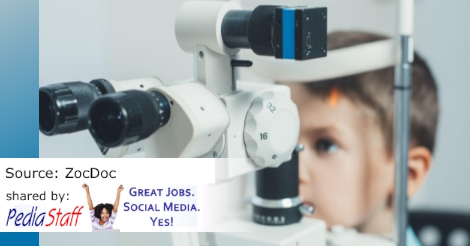Pediatric Therapy Corner: Caring for the Eyes of Children with Developmental and Intellectual Disabilities

Editor’s Note: Great resource for the caregivers of your patients!
[Source: Zocdoc]
We all know how important it is to be able to see clearly, but for children with special needs it
can be difficult to assess visual impairments. However, children with intellectual and
developmental disabilities (IDD) are at a higher risk of developing eyesight problems, so it's
of the utmost importance that they receive adequate care in this department.
Children with an IDD may have difficulty communicating their quality of vision with their
caregivers, and often may not be able to effectively explain their experience. This presents
challenges for caregivers and health providers when it comes to diagnosing any potential
eyesight issues, and may hinder or delay treatment.
It's also important to be able to access a health professional or ophthalmologist who is
compassionate, experienced and knowledgeable with regards to diagnosing and treating
those of us who need a little extra time and care. When caring for a child with a disability, it’s
worth researching their doctor and meeting with them one-on-one before they begin any
treatment plans for your child, to ensure they will be a good match.
This thorough guide from Zocdoc explores the obstacles that make caring for the eyes of
children with special needs more challenging, and also gives some helpful advice for helping
your child access the care they need for their eyesight. From mentally preparing your child
for an eye exam right through to where to seek financial support, this resource is invaluable
for caregivers of children with special needs.
PediaStaff is Hiring!
All JobsPediaStaff hires pediatric and school-based professionals nationwide for contract assignments of 2 to 12 months. We also help clinics, hospitals, schools, and home health agencies to find and hire these professionals directly. We work with Speech-Language Pathologists, Occupational and Physical Therapists, School Psychologists, and others in pediatric therapy and education.
